via AIDSmeds, by David Evans
A forthcoming research report suggests a number of personal lubricants can damage anal tissue cells and increase HIV replication, potentially heightening the risk of contracting HIV, notably if condoms aren’t used.
The “personal lubricant” market is a thriving one. One popular website sells 53 different brands, with many boasting several varieties. If you’d like one that tastes like fruit or chocolate, or adds the sensation of heat, you’ve got multiple options to choose from. The same goes for the degree of slipperiness, the type of sex you want to have, the ease of cleanup and, most important, condom compatibility.
What sexual accoutrement retailers can’t tell you is whether a lube will increase, decrease or have no effect on your chance of becoming infected with HIV if the condom breaks or you decide not to use a condom in the first place. Until recently, it wasn’t a question high on the list of researchers’ or manufacturers’ priorities—lubes are intended to keep condoms from tearing during sex, end of story. But for scientists at the Population Council, a New York City–based research organization at the forefront of HIV microbicide development efforts, the positive or negative effects of lubricants on HIV transmission has been a nagging issue for years.
New research results from the nonprofit organization suggest there may be reasons for concern. According to laboratory studies the group conducted—on schedule to be published in a forthcoming issue of AIDS Research and Human Retroviruses and currently available online—a large number of popular lubes may actually make it easier for HIV to get past the body’s defenses, notably during anal sex without a condom. Even more alarming is the finding that four lubes in particular cause HIV to reproduce up to four times faster than it does in the absence of such products.
Read the rest.
Read the IRMA Q&A on lubricant safety.
[If an item is not written by an IRMA member, it should not be construed that IRMA has taken a position on the article's content, whether in support or in opposition.]
A forthcoming research report suggests a number of personal lubricants can damage anal tissue cells and increase HIV replication, potentially heightening the risk of contracting HIV, notably if condoms aren’t used.
The “personal lubricant” market is a thriving one. One popular website sells 53 different brands, with many boasting several varieties. If you’d like one that tastes like fruit or chocolate, or adds the sensation of heat, you’ve got multiple options to choose from. The same goes for the degree of slipperiness, the type of sex you want to have, the ease of cleanup and, most important, condom compatibility.
What sexual accoutrement retailers can’t tell you is whether a lube will increase, decrease or have no effect on your chance of becoming infected with HIV if the condom breaks or you decide not to use a condom in the first place. Until recently, it wasn’t a question high on the list of researchers’ or manufacturers’ priorities—lubes are intended to keep condoms from tearing during sex, end of story. But for scientists at the Population Council, a New York City–based research organization at the forefront of HIV microbicide development efforts, the positive or negative effects of lubricants on HIV transmission has been a nagging issue for years.
New research results from the nonprofit organization suggest there may be reasons for concern. According to laboratory studies the group conducted—on schedule to be published in a forthcoming issue of AIDS Research and Human Retroviruses and currently available online—a large number of popular lubes may actually make it easier for HIV to get past the body’s defenses, notably during anal sex without a condom. Even more alarming is the finding that four lubes in particular cause HIV to reproduce up to four times faster than it does in the absence of such products.
Read the rest.
Read the IRMA Q&A on lubricant safety.
[If an item is not written by an IRMA member, it should not be construed that IRMA has taken a position on the article's content, whether in support or in opposition.]
